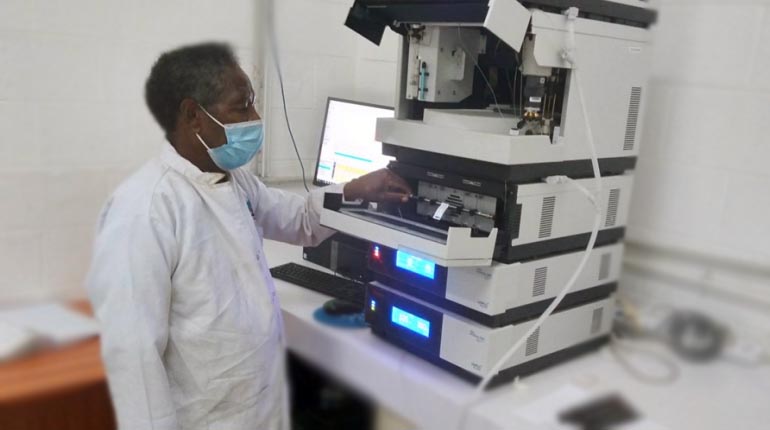PNG is rich in biological diversity. The value and sustainable use of this diversity can be optimized through the appropriate application of biotechnological tools for improving and sustaining food production. These can be employed through plant and animal breeding, bioremediation processes (relying on the diverse native soil and water microflora), application of diagnostic kits and preventive medicines in plants and animals, and research advances in novel bioactive compounds (pharmaceuticals, nutraceuticals, cosmeceuticals).
PNG has competencies (limited) within each research centre/institution, which can be harnessed through agreements to facilitate transboundary movement of experts and sharing of facilities. There are several centres of excellence to support biotechnological research and development (R&D) including molecular biology and genetic engineering at all levels.
There are several important biotechnological initiatives already in place in PNG which need to be fostered and better coordinated. These range from the implementation of biosafety regulatory frameworks and creation of biosafety and biotechnology awareness to trigger benefits of related projects for the large scale multiplication of crop species, genebanks, molecular marker applications and the production of vaccines. They will provide opportunities for knowledge sharing, employment and wealth creation, enhancement of food security and improvement of health.
PNG is also well placed to benefit from several international cooperation facilities to advance the process but priorities must be critically evaluated prior to entering into agreements if significant benefits are to accrue. * Biotechnology and agricultural development in PNG Biotechnology has the potential to be used to address problems in all areas of agricultural production and processing in PNG. This includes plant breeding to raise and stabilise yields to improve resistance to pests, diseases and abiotic stresses such as drought and cold and to enhance the nutritional content of foods.
Currently, biotechnology is being used by NARI on a smaller scale to develop low-cost disease-free planting materials for crops such as sweet potato, cassava and potato and assessment and conservation of biodiversity.
Other PNG institutions involved in promoting biotechnological research activities include DAMI Oil Palm, Coffee Industry Corporation, PNG National Botanical Gardens, PNG Cocoa and Coconut Institute, Unitech biotech centre and UPNG’s biology department. Various activities carried out by these institutes are highlighted in table 1.
In PNG, biotechnology R&D is still in its infancy and limited to affordable activities, mostly in vitro and allied techniques. To boost the successful establishment of biotechnology, it will require an adequate infrastructure, biosafety regulatory framework and capacity, expertise in tissue culture and molecular biology, and a critical mass of researchers appropriately supported with sustainable funding to cover the high cost of such research.
Currently, the only real application of biotechnology in PNG is tissue culture promoted by various educational and research institutions (Table 1). Most of these activities are relevant in the country in view of vegetative/clonal mode of propagation of the major food, ornamental and plantation crops. In oil palm, in vitro techniques have been judiciously and effectively used to complement conventional breeding techniques. In the past there has been a lack of priority setting in agricultural research, which is reflected in the lack of awareness and commitment by the national governments and as a result, no specific policy or strategy has been formulated.
Priority areas for PNG should be in plant and animal breeding, management of endemic diseases and pests, forest resources, development and promotion of pharmaceuticals, microbiology, nutritional security through crop improvement and use of probiotics, better conservation and sustainable use of valuable indigenous plant genetic resources, and improvement and promotion of unique local ornamental plants. * Case study – Micropropagation in PNG potato industry Potato is generally grown in the Highlands for food and income and is also a source of employment.
The farm-gate value of the potato industry was estimated to have been around K20 million some 6-7 years ago. Potato production was in decline in all production zones because of the severity of pest and disease problems that cannot be addressed successfully through agrochemical control for reasons of cost and negative environmental effects. The problem is exacerbated because potato is reproduced clonally; the use of diseased mother plants, therefore giving rise to diseased offspring. There is some relief now for the PNG potato industry with the use of biotechnology through “micropropagation of disease-free quality seeds”.
Micropropagation represents a means of regenerating disease-free potato plantlets from healthy explants grown aseptically under in vitro conditions. Virus indexed potato plantlets have been successfully multiplied in thousands using tissue-culture techniques. This currently forms the basis of our quality seed base in PNG.
Source: By ROBERT PLAK and RAKESH KAPILA PART 3 * The opportunities for PNG

